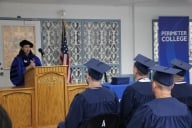You have /5 articles left.
Sign up for a free account or log in.
Personally, I’m ready to give up on “liberal arts,” even if that means sending Libby and Art into retirement.
In case you missed it, Gallup’s Brandon Busteed wrote in a blog post in August, that “putting the words liberal and arts together is a branding disaster.” As he noted,
"Liberal" is politically charged, and "arts" has a negative connotation regarding improving graduates' job prospects, which is the main reason why Americans and currently enrolled college students value higher education.”
Of course, there are abundant ironies in that statement, starting with the fact that we know that “liberal” arts don’t have much to do with “liberal” politics.
Yet that’s not how it appears. And I see the value of moving beyond what is essentially academic jargon, no matter how much we appreciate the resonance of a term beloved by those of us in higher ed. If a term, concept, or approach is misunderstood or outright disdained by many people, any good marketer would tell you that it’s time for rebranding. So instead of trying to defend or explain what the “liberal arts” are, let’s move on.
Of course, I don’t suggest dropping the liberal arts (or rebranding “liberal arts” education). Instead, let’s focus on what’s important about the liberal arts.
The fact is that there is great value in a liberal arts education. So even if we stop using the term “liberal arts” in describing an institution or an educational approach, there's still lot to talk about.
Focusing on outcomes
Today’s students want to know whether an institution’s approach to education works and whether it will help them get a job — and succeed. Any “liberal arts” college has plenty of stories about outcomes: it’s time to share them.
Many current business leaders believe that the liberal arts are the best foundation for learning to cope with what lies ahead, especially as college graduates step up to leadership positions later in their lives.
And there are plenty of examples of leaders in tech fields who speak and write about the value of their education at a “liberal arts” college.
Steve Jobs is the best known example, but there are many, many others. Here’s part of a Forbes article about the hot messaging app, Slack, used by many businesses and institutions:
Slack's core business benefits from the philosopher's touch. Hard-core engineers have been trying to build knowledge-management software for at least 15 years. Most of their approaches are so cumbersome that corporate users can't wait to quit. Slack makes everything simple. It bridges everything from Dropbox to Twitter, helping users organize documents, photos and data files into streamlined channels for easy browsing. Considering that [Stewart] Butterfield [cofounder and CEO] spent his early 20s trying to make sense of Wittgenstein's writings, sorting out corporate knowledge might seem simple. [url=
And if you missed it, Jason Fried, CEO of Basecamp, told Adam Bryant of the New York Times, that aside from having the skills to do a job, the top hiring criteria for his company is writing: “You have to be a great writer to work here, in every single position, because the majority of our communication is written, primarily because a lot of us work remotely but also because writing is quieter. And we like long-form writing where people really think through an idea and present it.”
In these times when so much information is coming at us in each moment, the ability to make sense of and focus on what’s important is essential to be successful in business (and in life). An education that teaches you how to think helps you to acquire that skill.
And while it’s very difficult to take a longer-term perspective on anything these days, data show that liberal arts graduates value highly their education and experience on campus. Over time, they understand more fully the benefits that accrue to them personally. We have to find a way to talk about that in ways that resonate with young people.
In short, we have plenty of stories that help to make a powerful case for an education based on the “liberal arts.” We can tell those stories without evoking a loaded term: but we need to tell them extremely well.








